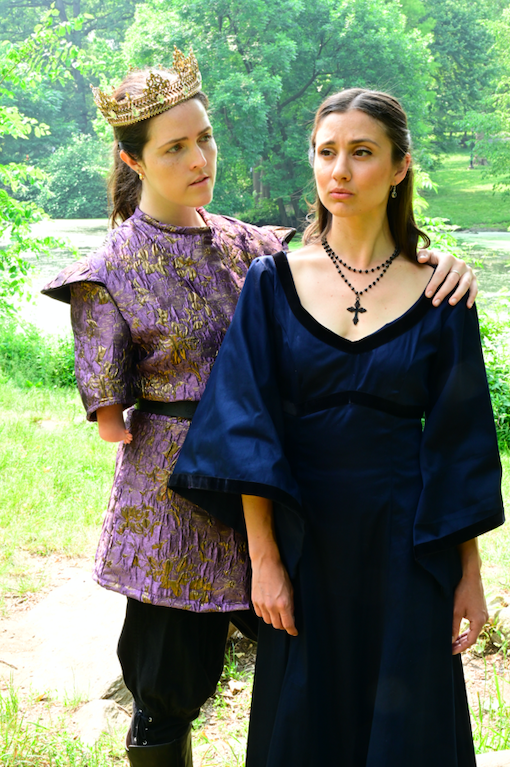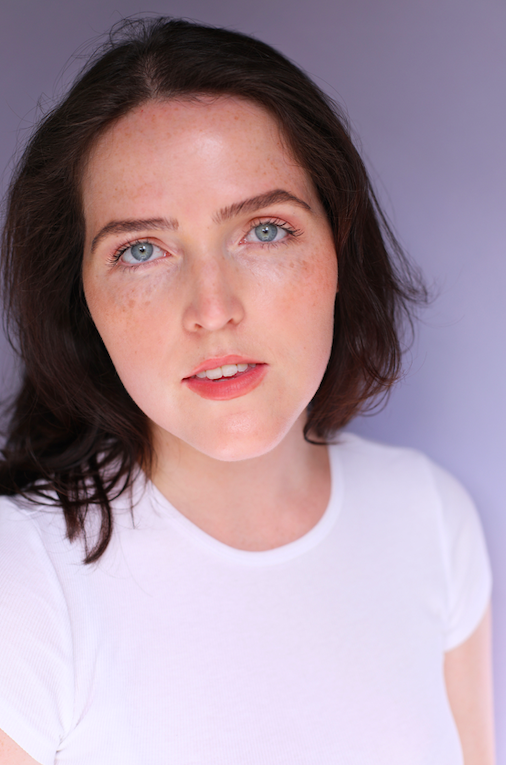INTERVIEW: Equity-driven ‘Richard III’ plays three parks in NYC
Photo: Richard III stars, from left, Connie Costanzo as Lady Anne and Delaney Feener as Richard. Photo courtesy of Miranda Arden / Provided by The Press Room with permission.
A new production of William Shakespeare’s Richard III, presented by New York Classical Theatre and directed by Stephen Burdman, promotes accessibility and equity when telling this classic tale. The cast is all-female, gender-fluid and disability-forward, according to a press release, and the production, which is staged outdoors, is in the midst of visiting three different parks in New York City.
Last week, Richard III performed in Central Park, and this weekend the company finishes its run in Brooklyn Commons at Metrotech. The final dates are July 4-9 at Carl Schurz Park on the Upper East Side of Manhattan.
Delaney Feener plays Richard. She’s well-acquainted with the Bard, having previously performed in A Midsummer Night’s Dream, Othello and Twelfth Night. Also performing is Pamela Sabaugh, portraying the Duchess of York and Stanley. Her work has taken her to the stages of The Attic Theatre in Detroit, The Court Theatre of Chicago, The Shakespeare Theatre of New Jersey and Amaryllis Theater.
“It’s an all-female, non-binary casting, seven actors playing all of the roles,” Sabaugh said in a recent phone interview. “Along with having it presented with these particular actors, including two disabled actors, is the retelling of the story for our times. … It’s sort of telling the story as Shakespeare wrote it, but through these bodies, and it’s a good, rip-roaring time outside — great language, great characters, all working off of each other, sword-fighting and killing, a lot of fun even amidst the tragedy.”
Feener added: “It’s rooted somewhat in the original tradition of Shakespeare, which is an outdoor venue. There are no mics. There is no setting or stage even. We’re just kind of in nature in the elements performing for whatever audience wants to be out there with us.”
Feener is a performer with a limb difference, and Sabaugh experiences low vision, according to a press release. Participating in disability-forward productions has been important to both actors. Feener’s screen debut was in Single, which played SXSW and centers on a woman with a limb difference. Sabaugh is a company member with Theatre Breaking Through Barriers.
“Accessibility and inclusion of people with disabilities in all aspects of life is very important in our society and not done, quite frankly, much at all,” Feener said. “And so including it in the theater realm, in the TV and film realm as well, just in terms of representation, I think is absolutely crucial. … I do believe that with this piece, specifically Richard III, a production should not be taking place unless you are having a disabled actor in the lead role. I think the story is completely useless if that’s not the case, and quite frankly even when there is an actor with a disability in the lead role, like myself, I feel it gets a little sticky because Shakespeare very much wrote this play to have the lead character be perceived as evil. So you really have to have a strong vision and idea going into it. I hope that our audiences are walking away seeing Richard for the first time with a little bit more empathy or a little bit of a different view because I am an actor with a disability.”
Sabaugh has immersed herself in the world of Richard III, trying to better understand her roles of the Duchess of York and Stanley. In fact, the director of the production combined the Duchess and Queen Margaret characters, which is interesting because the queen is the person in the cast who disparages Richard the most.
“I’m the mother of this Richard,” said Sabaugh, who once performed as Portia in off-Broadway’s The Merchant of Venice. “I looked at it from a mother who probably was responsible for creating this killing machine of a son. But then when the son turns on the family and kills my other son and then the most egregious act is the killing of the prince … that would be my grandson, those are the things that motivate my extreme hatred and cursing. It’s not the fact that this disabled son of mine is disabled and therefore I’m mad at him. He’s done all of these things, and I’m just grasping at my only power as a woman at that time, [which] is really to just curse the hell out of him because I have no other recourse to take charge in this male-dominated, patriarchal society.”
Feener said she approaches Richard with an empathetic lens. She believes that everyone is born an innocent baby, and much of their behavior is informed by the society in which they are raised.
“And so for me, I take a very strong stance on the fact that Richard, being a child with a disability in a royal family, was not probably treated super well growing up, whether that was exclusion or being taunted, etc., or just feeling like he didn’t have access to the world in the way that his older brothers did,” said Feener, who earned a Bachelor of Fine Arts from the Theatre School at DePaul University. “A lot of people have asked me, even post the show, ‘Do you think Richard is just a sociopath?’ I’m like, if that’s what the audience gets, that’s OK with me, but I as an actor cannot play the role assuming that. I try to make it clear that he is someone who has repeatedly hurt throughout his life and has turned to grief or power because of it. I believe that if you don’t find love in your life, you try to fill that wound with different things, and for Richard he becomes king of England.”
By John Soltes / Publisher / John@HollywoodSoapbox.com
Richard III, presented by New York Classical Theatre, continues through July 9. Click here for more information and tickets.




